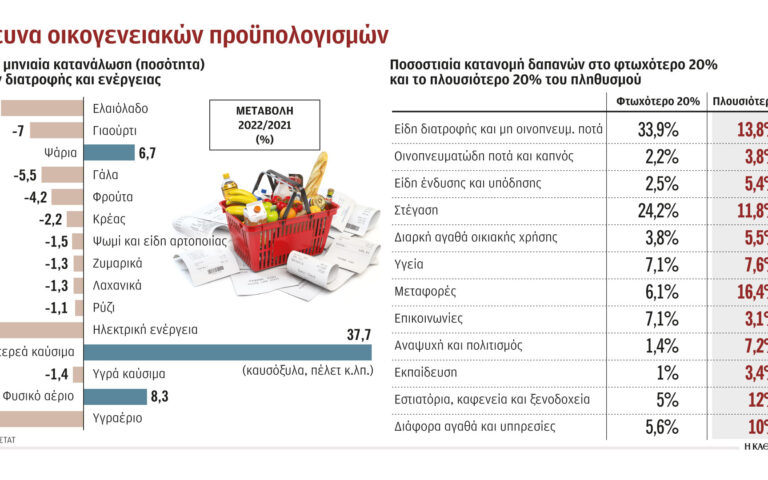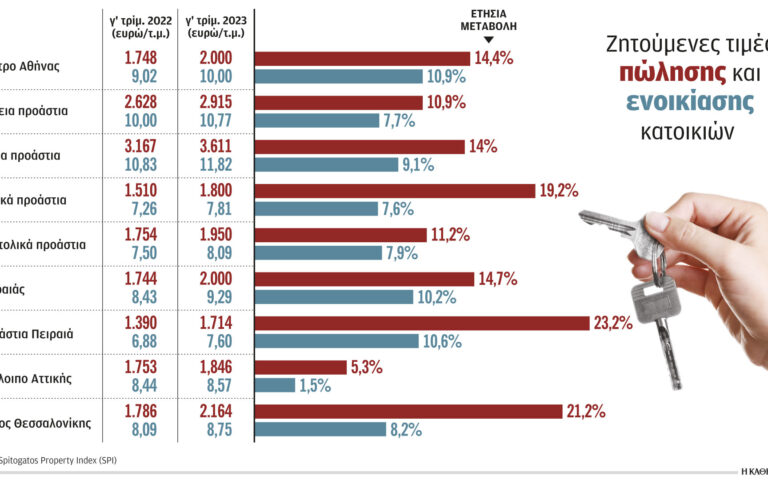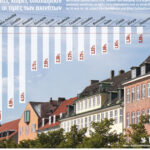The prices of have increased at a significantly faster rate rents in relation to the respective increases of salary benefits in Greece in recent years. According to a new survey carried out worldwide by the British company Online Mortgage Advisoran average worker in Athena currently needs to spend 55.9% of his income to pay his house rent. The corresponding percentage in 2018 was 42.4%.
Athens also shows the worst image compared to other cities in the country, which is explained by the fact that rents have increased more. According to the survey data, the second worst performance is found in Patras, where today 46.36% of the salary is required, when in 2018 38.56% of the monthly income was required. At Thessaloniki, one needs to spend 53.55% of his salary. Globally, it appears that 45.5% of cities have become less affordable to live in (through renting), a sample of the challenges created in many countries. The calculation has been made taking into account the average monthly income, compared to the average rental cost of a sq.m. in the city center, based on data from Numbeo.
This conclusion captures, in the clearest way, that household incomes have not increased at the required rate to offset and exceed the corresponding increases in rents. Thus, in practice, the living conditions for many households have worsened compared to 2018, even though the exit from the memorandum and the crisis has intervened and the country’s economy has recovered significantly.
Based on the data of the third quarter of 2023, from the online classifieds network Spitogatos, it appears that in Attica the average asking rental price is 9.25 euros/sq.m., increased by 8.2% on an annual basis. In the center of Athens, there is an increase of 10.9% to 10 euros/m², while in the southern suburbs, the average price reaches 12 euros/m², being 9.1% higher compared to corresponding period last year. In the northern suburbs, the increase is of the order of 7.7%, to 10.8 euros/sq.m.
Since 2012, the average salary has increased by 1.5%, when in the rest of the European countries the increase exceeds 17%.
Meanwhile, in another analysis, the company Utility Bidder (based on OECD data), it appears that during the decade 2012-2022 Greece shows the smallest increase in the average annual salary. Specifically, the increase does not exceed 1.5%, from 24,339 euros in 2012 to 24,709 in 2022, which is also the worst performance among the rest of the countries.

In contrast, in countries such as Austria the average annual income has increased by 24.7%, in Ireland by 23.8%, in Belgium by 22.9%, in Italy by 20.9% and in Spain by 17.9 %.
The findings of her analysis are similar Attica Bankin collaboration with IOBE, published yesterday.
In it, it is emphasized that in recent years there has been an increase in Price-To-Income ratio, which translates into increased housing costs. “The housing cost burden rate indicates that approximately 25% of Greek households spend more than 40% of their income on housing needs, as well as the highest percentage of their income among the rest of the member states. High energy costs lead a large percentage of households to payment delays, but also create consumption distortions,” the report emphasizes.
At the same time, according to Attica Bank, in relation to 2015, the Price-to-Rent index, in Greece, is the fourth largest in the EU, which means that there is strong upward pressure on selling prices. As Online Mortgage Advisor also notes, workers in Athens have also recorded the greatest reduction in their purchasing power in terms of acquiring a residence. In 2018, the average worker could buy almost 6 sq.m. (based on his annual income), a number that dropped to 4.2 sq.m. in 2022. This difference is further evidence of how quickly home sales prices have risen relative to incomes, a factor that does not bode well for maintaining demand at the same high level in the coming years.

The housing crisis is a pan-European problem
The housing crisis is developing into a common problem, regardless of the economic situation of each country. In Europe, affordable apartments to rent or buy are becoming an endangered species due to skyrocketing prices in recent years, while the relevant authorities are unable to ease the pressure on the sector.
In Portugal, the home ownership rate of young people under 25 has fallen by around 50% in twenty years.
In particular, according to data from the country’s central bank, 55% of those born between 1977 and 1986 had bought their own home by the age of 25, while this percentage dropped to 25% for those born after 1997. For the rapid decline the housing crisis is to blame, which has seen house prices rise by 8.7% over the past decade. Thus, although Portugal continues to record the highest rates of home ownership – of the order of 70% -, it is mainly based on the older ages.
Citizens are calling for measures such as support for buying a first home, building more affordable housing and upgrading derelict buildings.

Citizens of Luxembourg, who are among the wealthiest in the European Union, also face difficulty finding affordable housing. “Renting a two-bedroom apartment costs at least 2,000 euros,” a teacher and mother of three who waited five years to enter the social housing program told AFP recently. “Affordable housing is becoming scarce, especially for young people and single-parent families,” he stressed.
“More and more Luxembourgers are crossing the border to live in Germany, Belgium or France, precisely because rents and the housing market are lower,” confirmed Antoine Pacou, researcher at the Housing Observatory.
From Portugal to Luxembourg, affordable apartments to rent or buy are an endangered species.
Indicatively, the price of new apartments in the capital amounts to 13,000 euros per sq.m., while the older ones at 10,700 euros per sq.m. The average price of a new house is 1.5 million euros. Also, rents increased by 6.7% between June 2022 and June 2023, much faster than inflation of 3.4% for the same period. As a result, the housing crisis took center stage in Luxembourg’s latest election last Sunday, with both major parties pledging to tackle the problem.
And violent incidents
The situation has even worsened in countries such as Turkey, where violent incidents between landlords and tenants have been recorded (at least 11 deaths and 46 injuries from such incidents).
Rents have risen an average of 121% in the past year and in major cities as much as 188%. The surge in prices is attributed to the cost of living, rampant inflation and the mass relocation of earthquake victims in February.
The Turkish government has put a 25% cap on private rent increases. But experts say the measures have intensified pressures as landlords resort to other, possibly illegal, means to extract higher rent.
In the first half of this year there were about 47,000 eviction cases and 100,000 cases of illegal rent increases. According to the Turkish press, this is more than double the number compared to the same period in 2022.








